人教新目标(Go for it)版九年级全册Unit 1 How can we become good learners Section B(2a~2e)课件(共30张PPT)
文档属性
| 名称 | 人教新目标(Go for it)版九年级全册Unit 1 How can we become good learners Section B(2a~2e)课件(共30张PPT) |
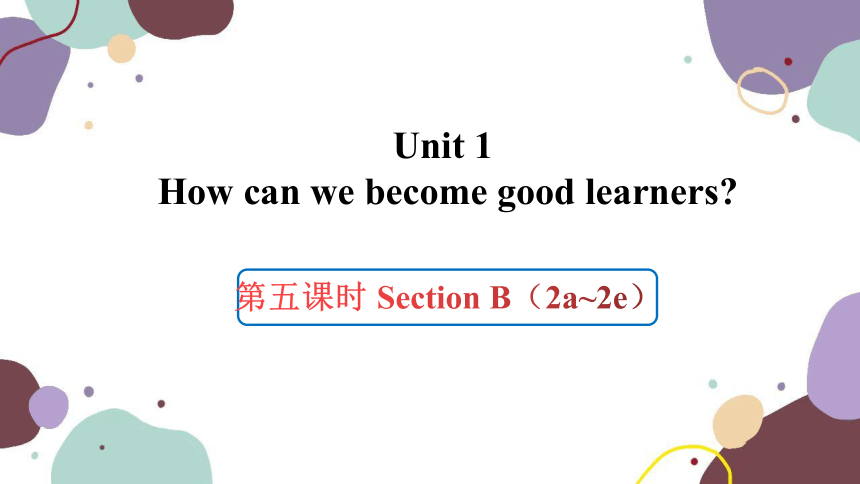
|
|
| 格式 | pptx | ||
| 文件大小 | 5.9MB | ||
| 资源类型 | 教案 | ||
| 版本资源 | 人教新目标(Go for it)版 | ||
| 科目 | 英语 | ||
| 更新时间 | 2023-06-27 09:59:04 | ||
图片预览

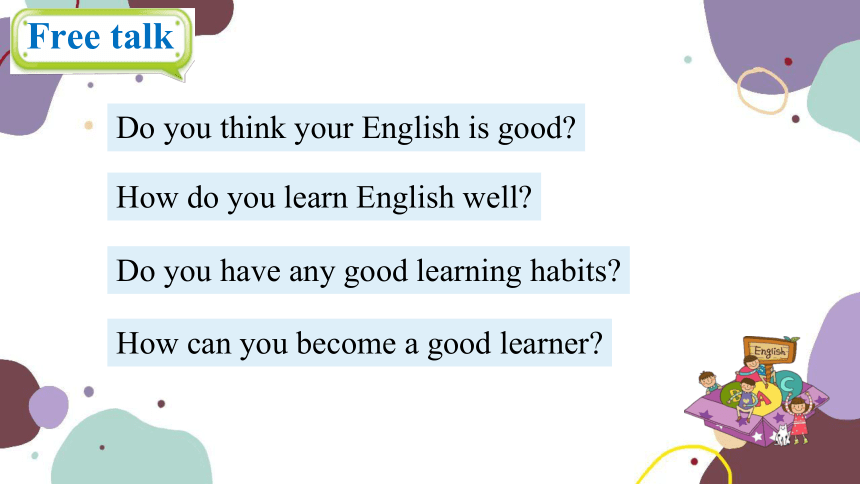
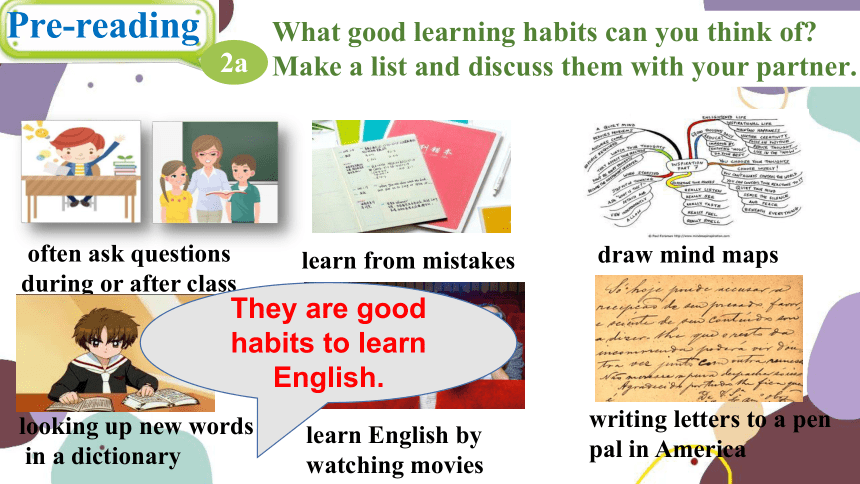

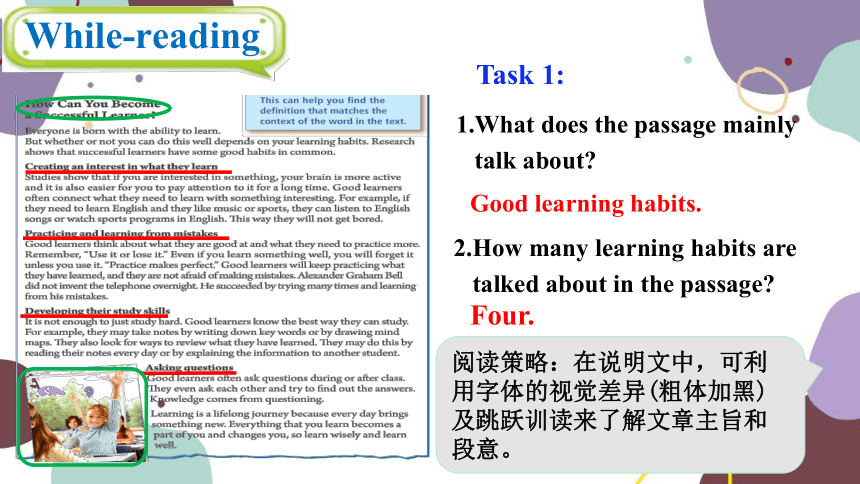
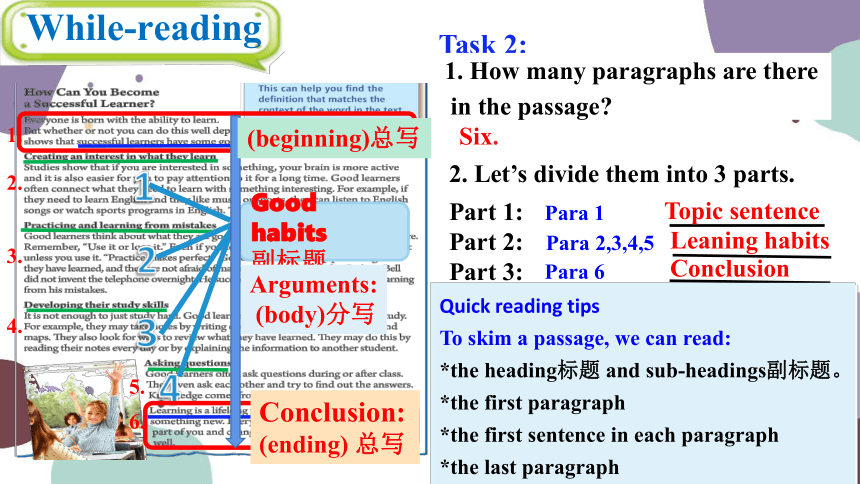
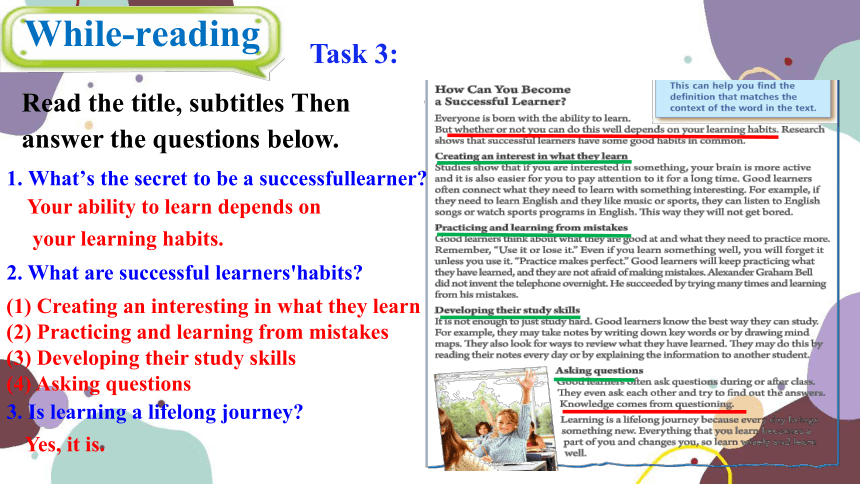
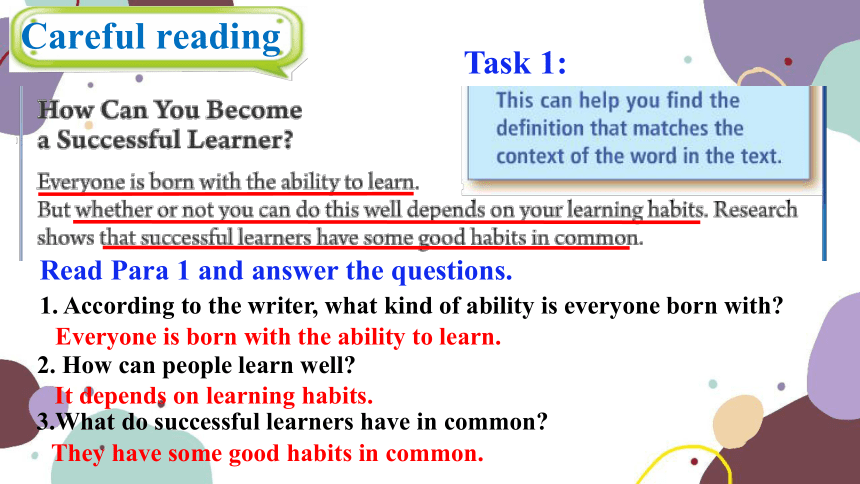
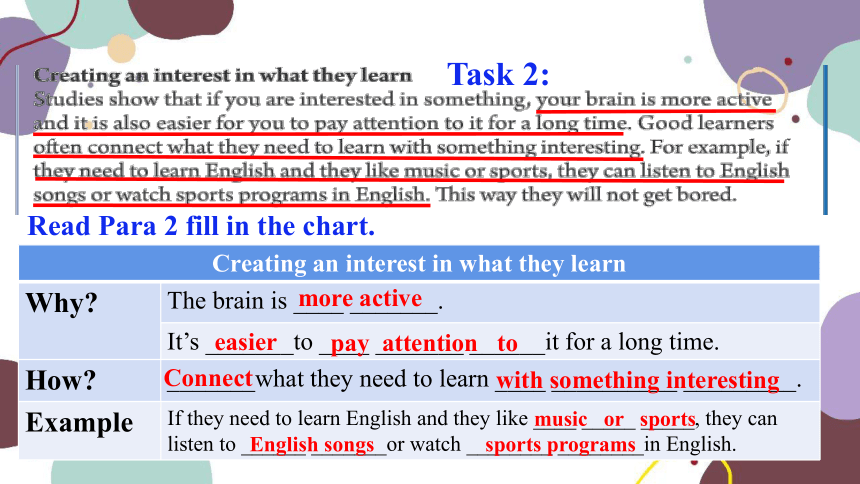
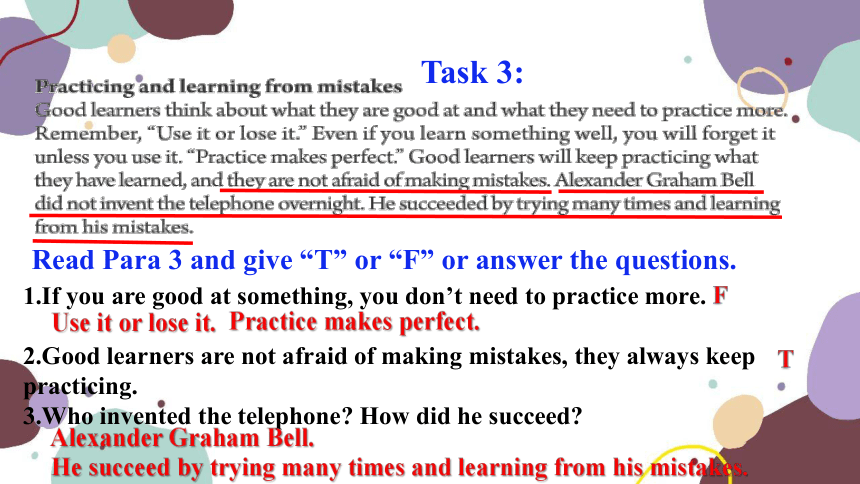
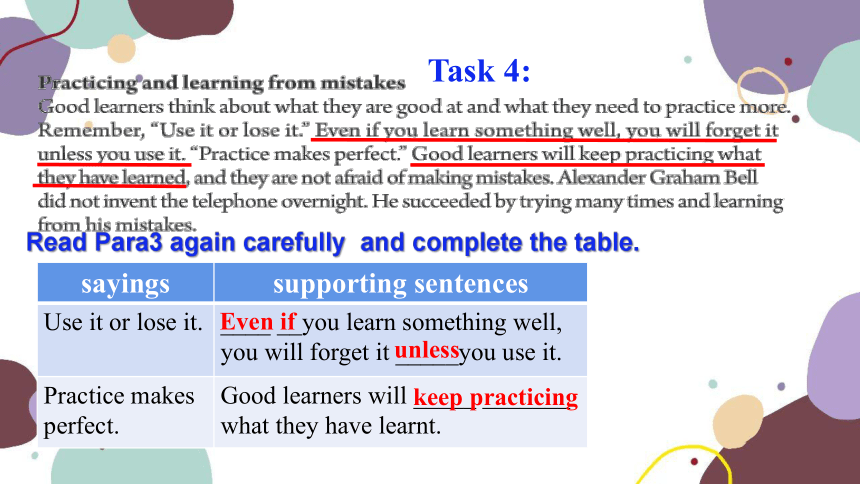

文档简介
(共30张PPT)
Unit 1
How can we become good learners
第五课时 Section B(2a~2e)
Do you think your English is good
How do you learn English well
Do you have any good learning habits
How can you become a good learner
Free talk
What good learning habits can you think of Make a list and discuss them with your partner.
2a
often ask questions
during or after class
learn from mistakes
draw mind maps
looking up new words
in a dictionary
learn English by
watching movies
writing letters to a pen
pal in America
They are good habits to learn English.
Pre-reading
Are these habits good or bad Why
listening to music when learning
sleeping in class
talking with other
students in class
not paying attention
to the teacher
not answering the questions
copying homework
They are not good habits for learning English.
Discussion
Task 1:
What does the passage mainly
talk about
Good learning habits.
2.How many learning habits are
talked about in the passage
Four.
阅读策略:在说明文中,可利用字体的视觉差异(粗体加黑)及跳跃训读来了解文章主旨和段意。
While-reading
Task 2:
1. How many paragraphs are there
in the passage
1.
2.
3.
4.
6.
5.
Six.
2. Let’s divide them into 3 parts.
Part 1:
Part 2:
Part 3:
Para 1
Para 2,3,4,5
Para 6
Topic sentence
1
2
3
4
Good habits
副标题
Leaning habits
Conclusion
(beginning)总写
Arguments:
(body)分写
Conclusion:
(ending) 总写
Quick reading tips
To skim a passage, we can read:
*the heading标题 and sub-headings副标题。
*the first paragraph
*the first sentence in each paragraph
*the last paragraph
While-reading
Task 3:
Read the title, subtitles Then answer the questions below.
1. What’s the secret to be a successfullearner
Your ability to learn depends on
your learning habits.
2. What are successful learners'habits
(1) Creating an interesting in what they learn
(2) Practicing and learning from mistakes
(3) Developing their study skills
(4) Asking questions
3. Is learning a lifelong journey
Yes, it is.
While-reading
Task 1:
Read Para 1 and answer the questions.
1. According to the writer, what kind of ability is everyone born with
2. How can people learn well
3.What do successful learners have in common
Everyone is born with the ability to learn.
It depends on learning habits.
They have some good habits in common.
Careful reading
Task 2:
Read Para 2 fill in the chart.
Creating an interest in what they learn Why The brain is ____ _______.
It’s _______to ____ _______ ______it for a long time.
How _______what they need to learn ____ __________ _________.
Example If they need to learn English and they like ____ _____ _____, they can listen to ______ _______or watch ________ ________in English.
more active
easier
pay attention to
Connect
with something interesting
music or sports
English songs
sports programs
Task 3:
Read Para 3 and give “T” or “F” or answer the questions.
1.If you are good at something, you don’t need to practice more.
2.Good learners are not afraid of making mistakes, they always keep practicing.
3.Who invented the telephone How did he succeed
F
Use it or lose it.
Practice makes perfect.
T
Alexander Graham Bell.
He succeed by trying many times and learning from his mistakes.
Task 4:
Read Para3 again carefully and complete the table.
sayings supporting sentences
Use it or lose it. ____ __you learn something well,
you will forget it _____you use it.
Practice makes perfect. Good learners will _____ _______
what they have learnt.
unless
Even if
keep practicing
Task 5:
Read Para 4 carefully and finish the mind map.
How to develop
their study skills
They may ________ by writing down _________or by drawing___________.
They ________ ways to________ what they have learned.
They do this by ___________ or by ________ the information ___ another student.
take notes
key words
mind maps
look for
review
reading notes
explaining
to
Task 6:
Read the last two Paras and
answer the questions.
Why do we think knowledge
comes from questioning
2. Do you agree that learning is a
lifelong journey Why or why not
3. Why do we need to learn wisely
and learn well
Because good learners often ask questions
during or after class. They even ask each other
and try to find out answers.
Yes. Because every day brings something new.
Because everything that you learn becomes
a part of you and changes you.
Task 7:
Read the passage again and answer the questions.
Does the writer think that everyone is born with the ability to learn well Do you agree Why or why not
No, he/she doesn’t. Yes, I do. Because whether or not one can learn well depends on his/ her learning habits.
2. Why is it a good idea to connect something you need to learn with something you are interested in
This is because studies show that if you are interested in something, your brain is more active and it is also easier for you to pay attention to it for a long time. You will also not get bored.
2c
3. What do the sayings “Use it or lose it” and “Practice makes perfect” mean Do you agree with them
(1) Use it or lose it: Even if we learn something well, we will forget it unless we use it.
(2) Practice makes perfect: We should keep practicing what we have learned so that we can be good at it.
(3) Yes, I do.
4. Do good learners learn from mistakes, or are they afraid of making mistakes
Good learners learn from mistakes, and they are not afraid of making mistakes.
5. What study skills does the writer talk about Do you have those study skills
Taking notes by writing down key words or by drawing mind maps, looking for ways to review what has been learned, for example, doing this by reading notes every day or by explaining the information to another student.
Yes, I do./ No, I don’t.
6. Do you agree that learning is a lifelong journey Why or why not
Yes, I do. Because every day brings something new.
How can we become a successful learner
Topic:(论点)
Successful learners have …..
Argument:
(论据)
create an interest
…
your …. is more active and you can …… it for a long time
practice and learn ….
Practice …...
We can learn a lot.
develop ……
They can help us learn better
ask questions
Knowledge comes from …..
Conclusion: (得出结论)
Learning is a ….. journey, so learn ….and learn…...
2. Retell the passage according to the mind map.
Post-reading
Look up the following words from the passage in the dictionary. Then write a passage for each word.
e.g. brain: A good way to train the brain is to do some
math exercises every day.
brain n. connect v. overnight adv.
attention n. review v. knowledge n.
ability n. active adj. wisely adv.
2d
Discussion
Do you think you are a good learner What learning habits do you think are useful Discuss with your groups and share your ideas with the class.
A: I think another way to become a successful learner is by trying to think about the same thing in different ways.
B: I agree. I believe that…
For example:
I think watching English movies can improve my listening skills. Also, I think asking questions is helpful.
2e
Discussion
looking up new words
in the dictionary
correcting mistakes in time
asking the teacher for help
taking notes
be active in class
listening to the teacher carefully
some good habits
1. But whether or not you can do this well depends on your learning habits.
1) whether or not you can do it well是从句,作句子的主语。即主语从句。
e.g. Whether you did it right or wrong isn’t so important.
What’s important is the experience you gained.
Language points
2) whether or not是从句的一个连词结构,意思和功能相当于whether, “是否”,常出现在宾语从句,主语从句中。也可把whether和or not分开,or not放到句尾。
e.g. I can’t tell whether or not the teacher likes me.
= I can’t tell whether the teacher likes me or not.
3) depend on/ upon 依据;依赖
depend on sb./ sth. to do sth.
e.g. We depend entirely on donations from the public.
我们完全依赖公众的捐助。
2. Research shows that successful learners have some good habits in common.
have sth. in common (with sb./ sth.)
(与某人、某物有相同之处)
e.g. Their methods have a lot in common.
他们的方法有很多相同之处。
They have much in common with their neighbors just
across the border.
他们与边境那边相邻而居的人们有许多共同点。
3. Studies show that if you are interested in something, your brain is more active and it is also easier for you to pay attention to it for a long time.
1) be interested in sth. / doing sth. 对……很感兴趣
(1) interested:修饰人,描述人的声音、表情或感受
(2) interesting:修饰事物,描述事物的状态或性质
2) It is adj. for sb. to do sth.
若形容词表示事物特征的,如:easy, difficult, hard, important等,
须用介词for。
It’s +adj. (kind, honest, friendly) + (of sb.) to do sth.
若形容词表示人的性格、品质与特点,如:good, kind, nice, wrong等,用介词of。
e.g. It’s very kind of you to help me with my English.
4. Good learners often connect what they need to learn with something interesting.
connect v. 连接;把……联系起来
当表示“把两个物体(A和B)连接起来”时,常用结构connect A to / with / B,其中to多用来强调动作。
e.g. Connect the speaker to/ with the record player, please.
The subway connects the train station to/ with the airport.
5. Good learners think about what they are good at and what they need to practice more.
1) [think短语]
think about 考虑 think of 想到,认为
think over 仔细考虑 think out 考虑好
think up 想出来 think through 认真地考虑
2) practice doing sth. 练习做某事
e.g.Practice speaking English.
6. Even if you learn something well, you will forget it
unless you use it.
even if引导让步状语从句,意为“即使/虽然”,等同于even
though /although /though,可置于句首或主句后,不能与
but连用。
e.g. Even if it’s hard work, I enjoy it.
=Even though/Although/Though it’s hard work, I enjoy it.
He will come on time even if it rains.
Ⅰ.根据句意及汉语提示完成句子
1.Though my grandmother is eighty years old,she is still very ________ (活跃的).
2.The more I get to know Amy,the more I realize that we have a lot in ________ (共同的).
3.I don't know ________(是否) or not I can get there on time.
4.If you do the same things month after month,you may get ________ (厌烦的).
5.Could you please tell me how to improve my reading ________ (能力)
active
common
whether
bored
ability
Exercises
Ⅱ.根据汉语意思完成句子
1. 马丁好像总是在拼写方面犯错。
It seems that Martin always ________ ________ ________ ________.
2. 为了学好物理,首先你必须对它感兴趣。
To learn physics well, first you must ______ ______ ______ ________.
3. 健康取决于均衡的饮食、新鲜的空气和充足的睡眠。
Health ________ ________ a balanced diet, fresh air and enough sleep.
4. 他们在不同的环境中长大,因此几乎没有共同之处。
They grew up in different environments, so they ____ _____ ____ ______.
makes mistakes in spelling
be interested in it
depends on
have little in common
Homework
Look up the following words from the passage in the dictionary. Then write a sentence for each word.
brain n. connect v. overnight adv.
attention n review v. knowledge n.
ability n. active adj. wisely adv.
Unit 1
How can we become good learners
第五课时 Section B(2a~2e)
Do you think your English is good
How do you learn English well
Do you have any good learning habits
How can you become a good learner
Free talk
What good learning habits can you think of Make a list and discuss them with your partner.
2a
often ask questions
during or after class
learn from mistakes
draw mind maps
looking up new words
in a dictionary
learn English by
watching movies
writing letters to a pen
pal in America
They are good habits to learn English.
Pre-reading
Are these habits good or bad Why
listening to music when learning
sleeping in class
talking with other
students in class
not paying attention
to the teacher
not answering the questions
copying homework
They are not good habits for learning English.
Discussion
Task 1:
What does the passage mainly
talk about
Good learning habits.
2.How many learning habits are
talked about in the passage
Four.
阅读策略:在说明文中,可利用字体的视觉差异(粗体加黑)及跳跃训读来了解文章主旨和段意。
While-reading
Task 2:
1. How many paragraphs are there
in the passage
1.
2.
3.
4.
6.
5.
Six.
2. Let’s divide them into 3 parts.
Part 1:
Part 2:
Part 3:
Para 1
Para 2,3,4,5
Para 6
Topic sentence
1
2
3
4
Good habits
副标题
Leaning habits
Conclusion
(beginning)总写
Arguments:
(body)分写
Conclusion:
(ending) 总写
Quick reading tips
To skim a passage, we can read:
*the heading标题 and sub-headings副标题。
*the first paragraph
*the first sentence in each paragraph
*the last paragraph
While-reading
Task 3:
Read the title, subtitles Then answer the questions below.
1. What’s the secret to be a successfullearner
Your ability to learn depends on
your learning habits.
2. What are successful learners'habits
(1) Creating an interesting in what they learn
(2) Practicing and learning from mistakes
(3) Developing their study skills
(4) Asking questions
3. Is learning a lifelong journey
Yes, it is.
While-reading
Task 1:
Read Para 1 and answer the questions.
1. According to the writer, what kind of ability is everyone born with
2. How can people learn well
3.What do successful learners have in common
Everyone is born with the ability to learn.
It depends on learning habits.
They have some good habits in common.
Careful reading
Task 2:
Read Para 2 fill in the chart.
Creating an interest in what they learn Why The brain is ____ _______.
It’s _______to ____ _______ ______it for a long time.
How _______what they need to learn ____ __________ _________.
Example If they need to learn English and they like ____ _____ _____, they can listen to ______ _______or watch ________ ________in English.
more active
easier
pay attention to
Connect
with something interesting
music or sports
English songs
sports programs
Task 3:
Read Para 3 and give “T” or “F” or answer the questions.
1.If you are good at something, you don’t need to practice more.
2.Good learners are not afraid of making mistakes, they always keep practicing.
3.Who invented the telephone How did he succeed
F
Use it or lose it.
Practice makes perfect.
T
Alexander Graham Bell.
He succeed by trying many times and learning from his mistakes.
Task 4:
Read Para3 again carefully and complete the table.
sayings supporting sentences
Use it or lose it. ____ __you learn something well,
you will forget it _____you use it.
Practice makes perfect. Good learners will _____ _______
what they have learnt.
unless
Even if
keep practicing
Task 5:
Read Para 4 carefully and finish the mind map.
How to develop
their study skills
They may ________ by writing down _________or by drawing___________.
They ________ ways to________ what they have learned.
They do this by ___________ or by ________ the information ___ another student.
take notes
key words
mind maps
look for
review
reading notes
explaining
to
Task 6:
Read the last two Paras and
answer the questions.
Why do we think knowledge
comes from questioning
2. Do you agree that learning is a
lifelong journey Why or why not
3. Why do we need to learn wisely
and learn well
Because good learners often ask questions
during or after class. They even ask each other
and try to find out answers.
Yes. Because every day brings something new.
Because everything that you learn becomes
a part of you and changes you.
Task 7:
Read the passage again and answer the questions.
Does the writer think that everyone is born with the ability to learn well Do you agree Why or why not
No, he/she doesn’t. Yes, I do. Because whether or not one can learn well depends on his/ her learning habits.
2. Why is it a good idea to connect something you need to learn with something you are interested in
This is because studies show that if you are interested in something, your brain is more active and it is also easier for you to pay attention to it for a long time. You will also not get bored.
2c
3. What do the sayings “Use it or lose it” and “Practice makes perfect” mean Do you agree with them
(1) Use it or lose it: Even if we learn something well, we will forget it unless we use it.
(2) Practice makes perfect: We should keep practicing what we have learned so that we can be good at it.
(3) Yes, I do.
4. Do good learners learn from mistakes, or are they afraid of making mistakes
Good learners learn from mistakes, and they are not afraid of making mistakes.
5. What study skills does the writer talk about Do you have those study skills
Taking notes by writing down key words or by drawing mind maps, looking for ways to review what has been learned, for example, doing this by reading notes every day or by explaining the information to another student.
Yes, I do./ No, I don’t.
6. Do you agree that learning is a lifelong journey Why or why not
Yes, I do. Because every day brings something new.
How can we become a successful learner
Topic:(论点)
Successful learners have …..
Argument:
(论据)
create an interest
…
your …. is more active and you can …… it for a long time
practice and learn ….
Practice …...
We can learn a lot.
develop ……
They can help us learn better
ask questions
Knowledge comes from …..
Conclusion: (得出结论)
Learning is a ….. journey, so learn ….and learn…...
2. Retell the passage according to the mind map.
Post-reading
Look up the following words from the passage in the dictionary. Then write a passage for each word.
e.g. brain: A good way to train the brain is to do some
math exercises every day.
brain n. connect v. overnight adv.
attention n. review v. knowledge n.
ability n. active adj. wisely adv.
2d
Discussion
Do you think you are a good learner What learning habits do you think are useful Discuss with your groups and share your ideas with the class.
A: I think another way to become a successful learner is by trying to think about the same thing in different ways.
B: I agree. I believe that…
For example:
I think watching English movies can improve my listening skills. Also, I think asking questions is helpful.
2e
Discussion
looking up new words
in the dictionary
correcting mistakes in time
asking the teacher for help
taking notes
be active in class
listening to the teacher carefully
some good habits
1. But whether or not you can do this well depends on your learning habits.
1) whether or not you can do it well是从句,作句子的主语。即主语从句。
e.g. Whether you did it right or wrong isn’t so important.
What’s important is the experience you gained.
Language points
2) whether or not是从句的一个连词结构,意思和功能相当于whether, “是否”,常出现在宾语从句,主语从句中。也可把whether和or not分开,or not放到句尾。
e.g. I can’t tell whether or not the teacher likes me.
= I can’t tell whether the teacher likes me or not.
3) depend on/ upon 依据;依赖
depend on sb./ sth. to do sth.
e.g. We depend entirely on donations from the public.
我们完全依赖公众的捐助。
2. Research shows that successful learners have some good habits in common.
have sth. in common (with sb./ sth.)
(与某人、某物有相同之处)
e.g. Their methods have a lot in common.
他们的方法有很多相同之处。
They have much in common with their neighbors just
across the border.
他们与边境那边相邻而居的人们有许多共同点。
3. Studies show that if you are interested in something, your brain is more active and it is also easier for you to pay attention to it for a long time.
1) be interested in sth. / doing sth. 对……很感兴趣
(1) interested:修饰人,描述人的声音、表情或感受
(2) interesting:修饰事物,描述事物的状态或性质
2) It is adj. for sb. to do sth.
若形容词表示事物特征的,如:easy, difficult, hard, important等,
须用介词for。
It’s +adj. (kind, honest, friendly) + (of sb.) to do sth.
若形容词表示人的性格、品质与特点,如:good, kind, nice, wrong等,用介词of。
e.g. It’s very kind of you to help me with my English.
4. Good learners often connect what they need to learn with something interesting.
connect v. 连接;把……联系起来
当表示“把两个物体(A和B)连接起来”时,常用结构connect A to / with / B,其中to多用来强调动作。
e.g. Connect the speaker to/ with the record player, please.
The subway connects the train station to/ with the airport.
5. Good learners think about what they are good at and what they need to practice more.
1) [think短语]
think about 考虑 think of 想到,认为
think over 仔细考虑 think out 考虑好
think up 想出来 think through 认真地考虑
2) practice doing sth. 练习做某事
e.g.Practice speaking English.
6. Even if you learn something well, you will forget it
unless you use it.
even if引导让步状语从句,意为“即使/虽然”,等同于even
though /although /though,可置于句首或主句后,不能与
but连用。
e.g. Even if it’s hard work, I enjoy it.
=Even though/Although/Though it’s hard work, I enjoy it.
He will come on time even if it rains.
Ⅰ.根据句意及汉语提示完成句子
1.Though my grandmother is eighty years old,she is still very ________ (活跃的).
2.The more I get to know Amy,the more I realize that we have a lot in ________ (共同的).
3.I don't know ________(是否) or not I can get there on time.
4.If you do the same things month after month,you may get ________ (厌烦的).
5.Could you please tell me how to improve my reading ________ (能力)
active
common
whether
bored
ability
Exercises
Ⅱ.根据汉语意思完成句子
1. 马丁好像总是在拼写方面犯错。
It seems that Martin always ________ ________ ________ ________.
2. 为了学好物理,首先你必须对它感兴趣。
To learn physics well, first you must ______ ______ ______ ________.
3. 健康取决于均衡的饮食、新鲜的空气和充足的睡眠。
Health ________ ________ a balanced diet, fresh air and enough sleep.
4. 他们在不同的环境中长大,因此几乎没有共同之处。
They grew up in different environments, so they ____ _____ ____ ______.
makes mistakes in spelling
be interested in it
depends on
have little in common
Homework
Look up the following words from the passage in the dictionary. Then write a sentence for each word.
brain n. connect v. overnight adv.
attention n review v. knowledge n.
ability n. active adj. wisely adv.
同课章节目录
- Unit 1 How can we become good learners.
- Section A
- Section B
- Unit 2 I think that mooncakes are delicious!
- Section A
- Section B
- Unit 3 Could you please tell me where the restroom
- Section A
- Section B
- Unit 4 I used to be afraid of the dark.
- Section A
- Section B
- Unit 5 What are the shirts made of?
- Section A
- Section B
- Review of Units 1-5
- Unit 6 When was it invented?
- Section A
- Section B
- Unit 7 Teenagers should be allowed to choose their
- Section A
- Section B
- Unit 8 It must belong to Carla.
- Section A
- Section B
- Unit 9 I like music that I can dance to.
- Section A
- Section B
- Unit 10 You're supposed to shake hands.
- Section A
- Section B
- Review of Units 6-10
- Unit 11 Sad movies make me cry.
- Section A
- Section B
- Unit 12 Life is full of the unexpected
- Section A
- Section B
- Unit 13 We're trying to save the earth!
- Section A
- Section B
- Unit 14 I remember meeting all of you in Grade 7.
- Section A
- Section B
- Review of Units 11-14
